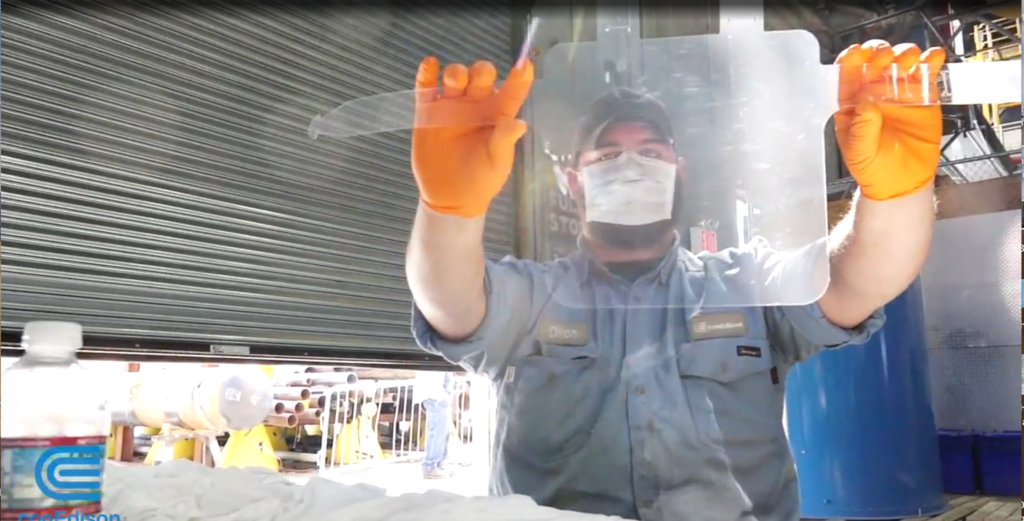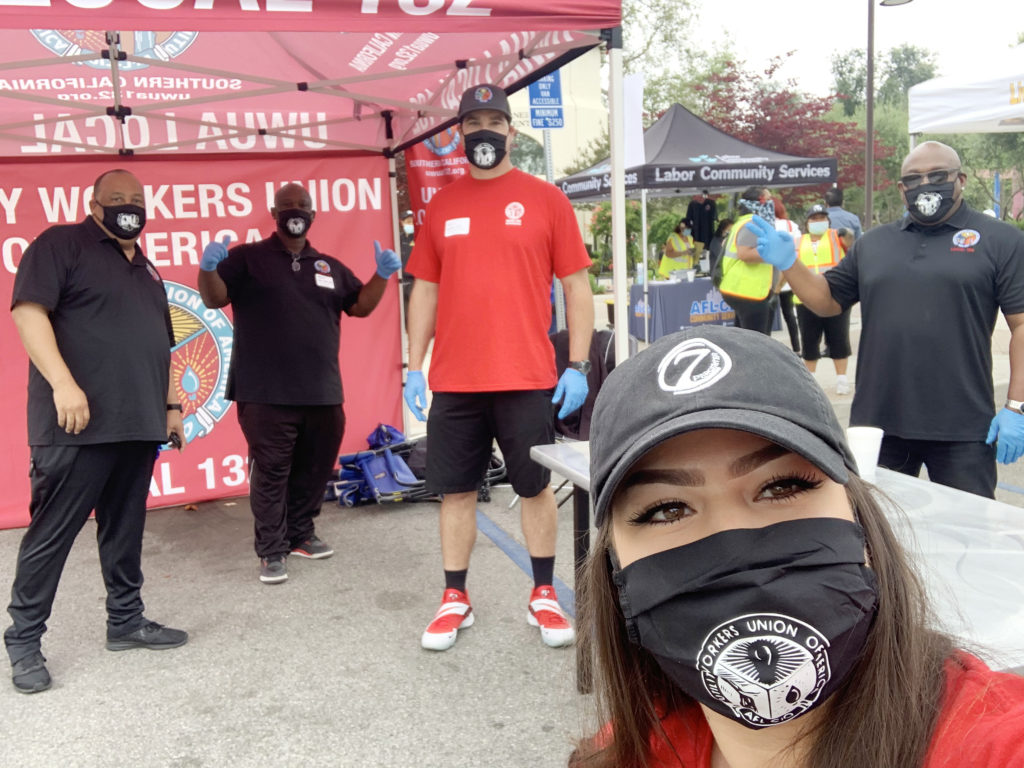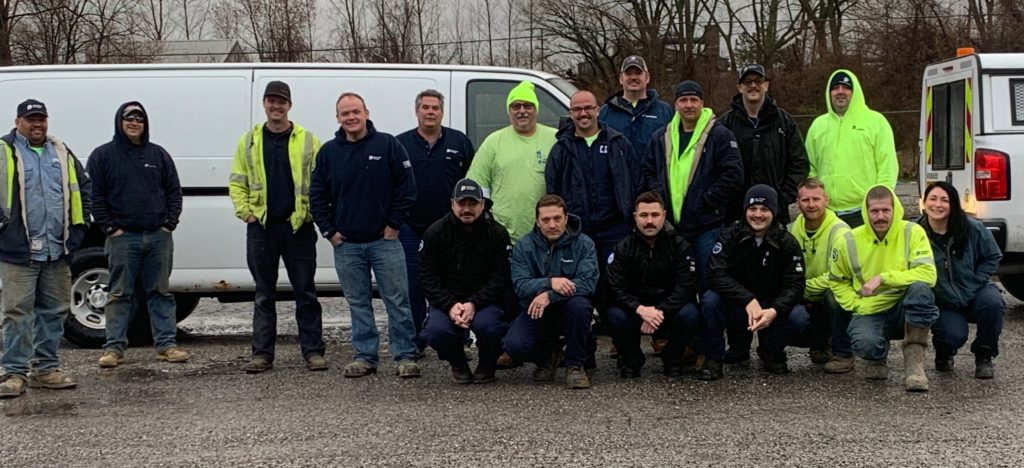Starting as a new team of UWUA National Officers, and only seven months in office, we never expected to be facing a pandemic. We feel blessed to be heading such a well-run organization with a membership second to none and the tools in place to tackle any emergency.
After all, we are Utility Workers, the safest, most productive, highest skilled workers in the world!
Throughout the deadly emergency, the staff of the UWUA has proven to be of extreme value to not only the members, but to the organization as a whole. Our national field staff have all been working overtime on CO-VID-19 issues. Our office staff, too, made the necessary adjustments to ensure that members receive the level of service they expect from the UWUA.
Safety first!

Importantly, we had a powerful national safety program in place before the pandemic hit. Across the country the National Safety Director, along with our National Safety Representatives, local safety representatives, local union leaders, and everyday members are leading the way with their employers in establishing safe work practices to ensure they can continue to provide the highest level of service for the customers they serve.
Our involvement in government affairs is more effective than ever before. This has helped us immensely in monitoring and influencing all the relevant decisions being made in Washington, D.C. and in the states, regarding the COVID-19 pandemic.
We are better able to communicate with members, with other organizations and are at the forefront of industry news coverage, thanks to our communications team.
Our finances are healthy and helping us weather this storm. And we have a database that is proving essential in running a national organization with 50,000 members.
A crisis like no other
Recognizing the COVID-19 crisis was nothing like anything we have dealt with before, we all leaned on each other, sharing insights and talking through issues as they arose. As your National Officers, we all agree the two most valuable things are our families and our members. And together, we are standing by the guiding principle: “How would my family feel about the decision I am about to make?”
As soon as the coronavirus started affecting our members, we worked with the National Executive Board, staff, and local officers to closely monitor companies to see which addressed COVID-19 in a proper manner and which did not. At first, many of our employers did not understand the magnitude of the virus. They did not realize how deadly it is.
When we brought our concerns about the safety of our members and their families to their attention, they responded and worked with us to make adjustments in work schedules, working conditions, and even pay and time off. Overwhelmingly, we have been successful in moving the utilities’ treatment of our members from what felt to many like “expendable” to “essential.” They now understand the importance of keeping us safe, healthy, and on the job.
Highlighting the best in us

The COVID-19 pandemic has highlighted the best in UWUA members across the country. The ability of the membership to apply their experience from other emergencies, not only as first responders but also committed to service to the public and their customers, has been impressive.
Our members are performing above and beyond their regular duties and responsibilities, particularly as they relate to ensuring their safety and the safety of their co-workers.
We are looking at the COVID-19 pandemic not only as an issue for today, but also as a harbinger of the future in the utility world. We know that after the 1911 Triangle Shirtwaist Factory fire and the 9/11 attacks, society was not the same. This will be true with the coronavirus as well.
We are First Responders!
We are making sure we are part of the change that will inevitably occur and the voice of the Utility Worker is heard. We need to make sure that our first responder status is highlighted and codified and staffing levels in utilities are addressed, because the status quo is no longer effective.
We need more utility workers than ever before and our employers need to start hiring now to prepare for the future. Our members need to be trained and promoted to their fullest potential. And employers need to plan for the possibility that they may not get mutual aid in an emergency.
One can only imagine what the scope of this pandemic would be without the reliable utility service provided by our members. Without electricity, doctors and nurses would not be able to plug in a ventilator. Without clean water, they wouldn’t be able to scrub for surgeries and the public would not be able to wash their hands effectively. People would not be able to shelter in place and be comfortable at home. We need to be recognized for what we do and are working to make that happen.
Michigan Representative Elissa Slotkin introduced a resolution in Congress honoring the service and sacrifice of frontline workers fighting COVID-19, including utility workers, and recognizing them not only as essential workers but essentially first responders.
Federal safety standards needed
We are also making sure utility workers, and other essential workers, are protected. We are pushing for federal standards requiring each employer to evaluate their workplace for the risk of airborne disease transmission and developing a comprehensive infection control plan that includes social distancing measures, masks and other personal protective equipment and employee training. Fortunately, we have been successful in getting our employers to do these things. Now it’s time to make this federal policy. We need safety standards and we need the federal government to enforce them.
During the early days of the pandemic, the volume of information was making it difficult to determine what was valuable and what was not. We quickly understood the most important information was not what was coming from above but what was actually happening on the ground. With input from the National Executive Board and staff, we created the Incident Communication Structure, or ICS, a formalized communication structure focused more on hearing what was actually happening in the field and responding to those needs, rather than mandating how to respond based on what we were hearing from above.
The ICS is flipping the typical communication triangle from the top down, to bottom up. Modeled on the Incident Command System used by government, utilities, and others in emergencies, our ICS is allowing the union to share information more effectively throughout our five regions and with our almost 225 locals.
Meanwhile, our Executive Board and National Staff meetings were changed from in-person to virtual. Our conferences in Regions II, III and V were cancelled, and our Regions I and IV conferences are paused, pending the status of the pandemic as those draw near. We are working on future online trainings that, while unable to replace in-person meetings, will provide valuable opportunities for members to gather, share their knowledge and build relationships.

Heightened interest in unions
Since the COVID-19 outbreak, there has been a heightened interest in joining unions. Workers with inadequate safety protections better understand that without a collective bargaining agreement they are powerless to address the crisis at work. More people are realizing that having a union really counts.
Union members, and non-union workers alike, have a new sense of the value of a union. Being a union member during a pandemic has proven a huge value, particularly when employers are making decisions on the fly and not always with worker safety in mind. Just as unions have guided employers through the safest ways to continue providing essential service during the pandemic, unions will continue to guide employers in how to return to normal operations when, and only when, it is safe to do so.
We are in for a period of rapid change. One thing has not changed, the core of what we do as a National Union, supporting our locals in collective bargaining, contract enforcement, and labor disputes. That will never change. If anything, COVID-19 is forcing us to do some things even better.
Stay safe. Stay healthy.
Your National Officers

